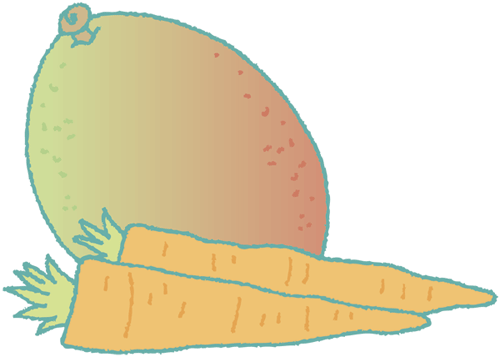|
As parents we have a responsibility to ensure that our little ones get everything they need to grow up strong and healthy. That doesn’t mean serving boring “health” food, but encouraging a fresh, delicious and varied diet that will provide your baby with all the key nutrients she needs.

| Q: |
My baby will eat only fruit purées; does this matter?
| | A: |
In the short-term, it is not a big problem, as your baby will be
getting plenty of nutrients from fruit. However, it won’t give your baby
protein or iron. It does also become an issue if your baby develops a
sweet tooth, as he will be reluctant to try anything that is not
“sugary,” which can make introducing other foods that much more
difficult. Fruit is very healthy, but it can cause a surge in blood
sugar, followed by a crash, which can leave your baby tired and
irritable. Moreover, it can, over time, cause tooth decay.
It’s much better to have
a mix of both fruits and vegetables. Try different combinations, such
as spinach and kiwi, parsnip and apple, or mango with carrots. Try, too,
introducing sweeter vegetables, such as sweetcorn, peas, sweet potato,
and squash on their own. Their natural sweetness can match the sweetness
of fruits.
|
| Q: |
When do I have to start making sure my baby’s diet is balanced?
| | A: |
When you begin weaning, you are offering tastes of a variety of
different foods to accustom your baby to the process of eating rather
than just drinking her usual milk, and also to encourage her to develop a
taste for different flavors and textures. At the outset, she’ll
probably have only one or two small meals a day, heavily subsidized by
her usual milk, which provides the vast majority of the nutrients she
requires. When her milk feeds become less frequent, and she is eating
more at mealtimes, usually around eight or nine months, it becomes
increasingly important that she gets a variety of different nutrients
from each of the main food groups: carbohydrates, fats, protein, and
vitamins and minerals.
It’s not as hard as
you may think to ensure that she has a balanced diet. If you aim for
plenty of fresh fruits and vegetables, with different foods presented
every day or so, plus some good-quality protein, such as red meat,
poultry, pulses, and fish, some healthy carbs (whole grains are your
best choice here), and some dairy products and eggs, too, your baby will
be getting exactly what she needs.
|
| Q: |
We want to raise our baby as a vegetarian; is there anything extra he needs at this age?
| | A: |
To begin with, a vegetarian baby’s diet is the same as for other
babies—a variety of fresh fruits and vegetables. Introduce your baby to
the huge variety of delicious vegetables available, and encourage him to
try as many as he can, so that your options are not limited as he gets
older.
The iron a baby
inherits from his mother runs out at around six months, so from six or
seven months, you should include iron-rich foods, such as pulses
(lentils and chickpeas), leafy green vegetables, eggs, and dried
apricots, in your baby’s diet. Whole-grain cereals are also a good
source, but do not give your baby too many, since his tummy is small.
It’s important to include foods like cheese and well-cooked eggs too.
These are good sources of protein and vitamin B12, which your baby needs
for growth and development.
Being vegan, however,
does mean cutting out two further main food groups: dairy and eggs.
These must be carefully replaced, so it may be useful to see a trained
dietitian. Also, if you give your baby at least 20fl oz (600ml) of
fortified infant soy formula daily, until he is two, he shouldn’t need
supplements.
|
| Q: |
How can I introduce pulses into my baby’s diet?
| | A: |
Lentils, peas, chickpeas, and beans, such as butter beans and
cannellini beans, are all good first foods, and will offer plenty of
protein and iron, as well as fiber and B vitamins, so are great for
vegetarian babies. Cook them thoroughly, and purée them with vegetables
to make them more tasty, and easier to swallow and digest .
Your baby doesn’t need
many of any type of pulse at this stage and age—a serving would
constitute no more than four or five individual peas or beans, or a
spoonful of lentils. So even adding a teaspoon of cooked pulses to your
baby’s normal purée and blending them together will provide some added
nutrition, and a different, unique texture. Many babies love hummus—look
out for brands with no added salt or make your own. Serve on toast
fingers, pita bread, or with carrots, cucumbers, and other veggies.
|
Did you know…
that carrots and
other brightly colored fruits and vegetables contain highly nutritious
nutrients known as carotenoids, which your baby’s body converts to
vitamin A? This vitamin is crucial for health and development, and
encourages healthy vision, immune system function, and strong, healthy
bones. If possible, steam rather than boil carrots, as this allows the
beta-carotene to be more bio-available and readily used by the body.
|